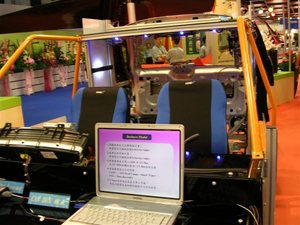China Aims for Leadership in Electric Vehicles
China hopes its aggressive development and construct
2010/04/02 | By Michelle HsuChina became the world's largest automaker in 2009. Now it is aiming for world leadership in electric vehicles (EVs), and some big Chinese companies are already taking the forefront in this field.
“China may surpass the U.S. in the EV field within 3-5 years, given its aggression in both EV and facility development,” according to a prediction by the ECOtality, an American leader in clean electric transportation and storage technologies.
When China's BYD signed a memorandum of understanding (MOU) with the Daimler Group of Germany to launch a joint EV brand in early March, its H-share (HK-listed share) price jumped 4.44% to close at HK$65.9, up 8.2 times over its price when Warren Buffett first purchased a 10% stake in the company for US$230 million in September 2008. (It has been reported that Buffet wants to boost his shareholding, but that BYD has not agreed.)
Under the MOU, BYD and Daimler will set up a venture focused on EV technology research in such areas as batteries, transmission systems, and other key parts. It will also develop EV models suitable for Chinese drivers.
BYD sold 100 of its F3DM-model EVs to government agencies and companies in the first half of 2009, and started to promote sales to individuals last September.
At the Geneva auto show earlier this year, the Chinese firm unveiled its new e6 EV, which is scheduled for launching simultaneously in China and the U.S. this year. The e6 is powered by the world's most powerful battery, giving it a cruising range of 330-400 km, and will be priced at around 30,000 euros.
Major Players
In China, several other automakers will also launch EV models this year. These include Chang'an Automobile, Changhe-Suzuki, Chery Automobile, and the SAIC Group, in addition to BYD.
Chang'an Automobile claims that its MINI EV is able to run 100 km on only 10 kilowatt-hours of electricity. The MINI is also distinguished by an entire-vehicle control system, electric control system, and lithium-ion power cells made with self-developed technologies. To support the formal launch of its EV, Chang'an has been mapping out an after-sales service network that will offer battery recharging, maintenance, and repair.
Chery Automobile, among China's most vigorous promoters of auto exports, is planning to locate its global EV research center in Taiwan to take the advantage of the island's human resource in the fields of batteries, auto motors, and electrical control systems. The company has already located a local agent to sell its EVs in Taiwan.
These cooperation projects were announced during a Cross-straits Auto Conference held in Taipei last November. Participants from both Taiwan and mainland China agreed that the EV is ideal for fostering cooperation between the two sides with the aim of dominating the global market with Chinese brands.

Eco-friendly Vehicles
The EV is regarded one of the most promising niches for the auto industry in light of its energy conservation and lack of CO2 emissions, which produce a greenhouse effect and promote global warming. When U.S. President Barack Obama visited China at the invitation of Chinese President Hu Jintao last November, the two sides held a constructive dialogue on the issue of climate change.
The joint statement issued by the two sides after the meeting stated, “the two sides welcomed the launch of a U.S.-China Electric Vehicles Initiative designed to put millions of electric vehicles on the roads of both countries in the years ahead.”
“Building on significant investments in electric vehicles in both the United States and China, the two governments announced a program of joint demonstration projects in more than a dozen cities, along with work to develop common technical standards to facilitate rapid scale-up of the industry.”
To realize the ideals expressed in the joint statement, China has already begun operating EVs in 13 municipalities which were selected as model electric transportation vehicle development cities.
Following the launch of its first batch of electric cars last year, China will continue to improve key technologies and accelerate work on related infrastructure, said Wan Gang, Minister of Science and Technology, at auto forum early last October.
China is expected to produce over 60,000 electric cars by 2012. According to Wan, China's demand for electric cars ranges from large buses to small sedans, and the country will develop all kinds of EVs to fill that demand.
Wan reported that China is working on the development of standards and a legal system for the promotion of EVs. He expressed the belief that the country's EV industry has entered the stage of rapid growth, and that it will be a major force in transforming the auto industry there.
To boost EV production, the Chinese government is offering subsidies ranging from 50,000-60,000 renminbi (RMB) per electric sedan and 420,000-500,000 RMB for each 10-meter electric bus.
Business Potential
Cooperation with the U.S. in this field will help China to develop the globally compatible EV standards that are vital to exports of EVs and key components.
The booming EV market will first lead to rising demand for lithium-ion power cells, and it is estimated that the global cell market will reach US$12.3 billion by 2015. An American lithium-ion power cell maker has already teamed up with a Chinese partner to set up a joint-venture manufacturing operation in China.
The German company Infineon believes that the EV industry will grow more rapidly in China than in the U.S. or Europe, where comprehensive gas-station networks will not be easily persuaded to add battery-charging services. According to Infineon, it might be easier to build recharging networks in China from scratch.




